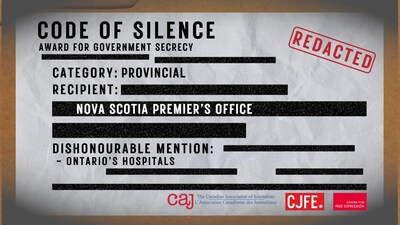TORONTO, May 22, 2024 /CNW/ – The Premier of Nova Scotia, Tim Houston, has been selected as the 2023 recipient of the provincial Code of Silence Award for Outstanding Achievement in Government Secrecy for his bait-and-switch on the 2021 election promise by his own government-to-be to strengthen his province’s notoriously toothless freedom of information law by giving order-making power to its information. commissioner.
The Code of Silence Awards are presented annually by the Canadian Association of Journalists (CAJ), the Centre for Free Expression at Toronto Metropolitan University (CFE), and the Canadian Journalists for Free Expression (CJFE). The awards call public attention to government or publicly-funded agencies that work hard to hide information to which the public has a right under access to information legislation.
The nomination for this award came from Stephen Kimber, a freelance journalist and Professor at the King’s School of Journalism, whose recent article in the Halifax Examiner documented the sad history of the Premier’s about-face in lurid detail.
“It is an affront to democracy every time elected politicians renege on election promises,” said Phil Tunley, past-president, and Board member of Canadian Journalists for Free Expression (CJFE), “but when they make promises to improve the basic accountability systems in which democracy itself operates, and still back away once they gain power, it becomes a scandal, a fraud on voters.”
“The effect of the current access regime in Nova Scotia is to vest power over public information vital to the functioning of democracy in the hands of civil servants, whose decision-making defaults to non-disclosure, and at the same time shelters elected politicians from accountability. With only the power to recommend, rather than to order disclosure subject to judicial review, the information commissioner is reduced to merely whining about things s/he cannot even describe,” Tunley said.
As Kimber’s story notes, Premier Houston’s commitment was born of his own unhappy experiences with Nova Scotia’s freedom of information system while in opposition, and he initially reaffirmed his commitment to reform publicly in the days immediately before and after his government’s election in August 2021. Within his first year in power, however, that commitment had softened to just “look at options”. Even that was later punted to an “internal review”, not even by politicians, but by the same civil servants who wield power to their own advantage in the current system. Ultimately, even that process was aborted when officials declined to even meet, and the whole hot potato has been postponed again to – surprise, surprise – just before the next election.
This year’s jury also wishes to bestow a dishonourable mention to Ontario’s public hospital system and its overseers. As documented in their recent article, when the Toronto Star and the Investigative Journalism Bureau sought access to suitably anonymized patient feedback forms, solicited to guide improvement in the hospital system, they were met with a stonewall.
“This story does not merely deprive voters of public information needed to engage meaningfully in hospital policy debate and reform,” Tunley said, “it actually deprives patients of their own information and observations provided to the government by them, specifically for that purpose”.
The remaining 2023 Code of Silence Awards will be handed out bi-weekly. This year’s winner in the municipal category will be announced on June 5.
The CAJ is Canada’s largest national professional organization for journalists from all media, representing members across the country. The CAJ’s primary roles are to provide high-quality professional development for its members and public-interest advocacy.
SOURCE Canadian Association of Journalists



